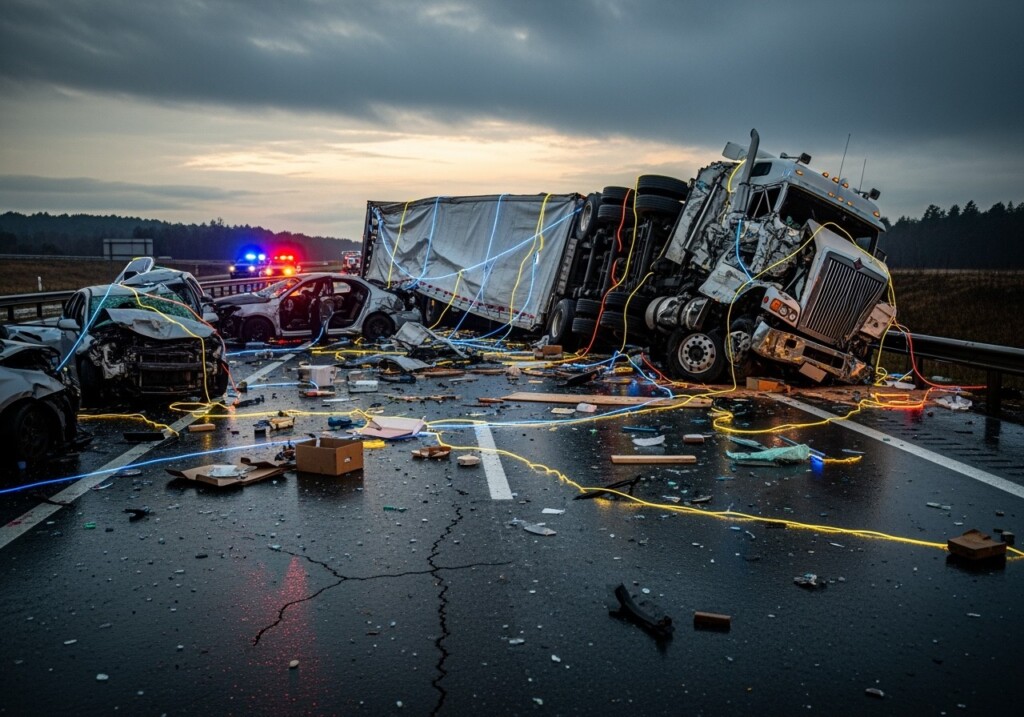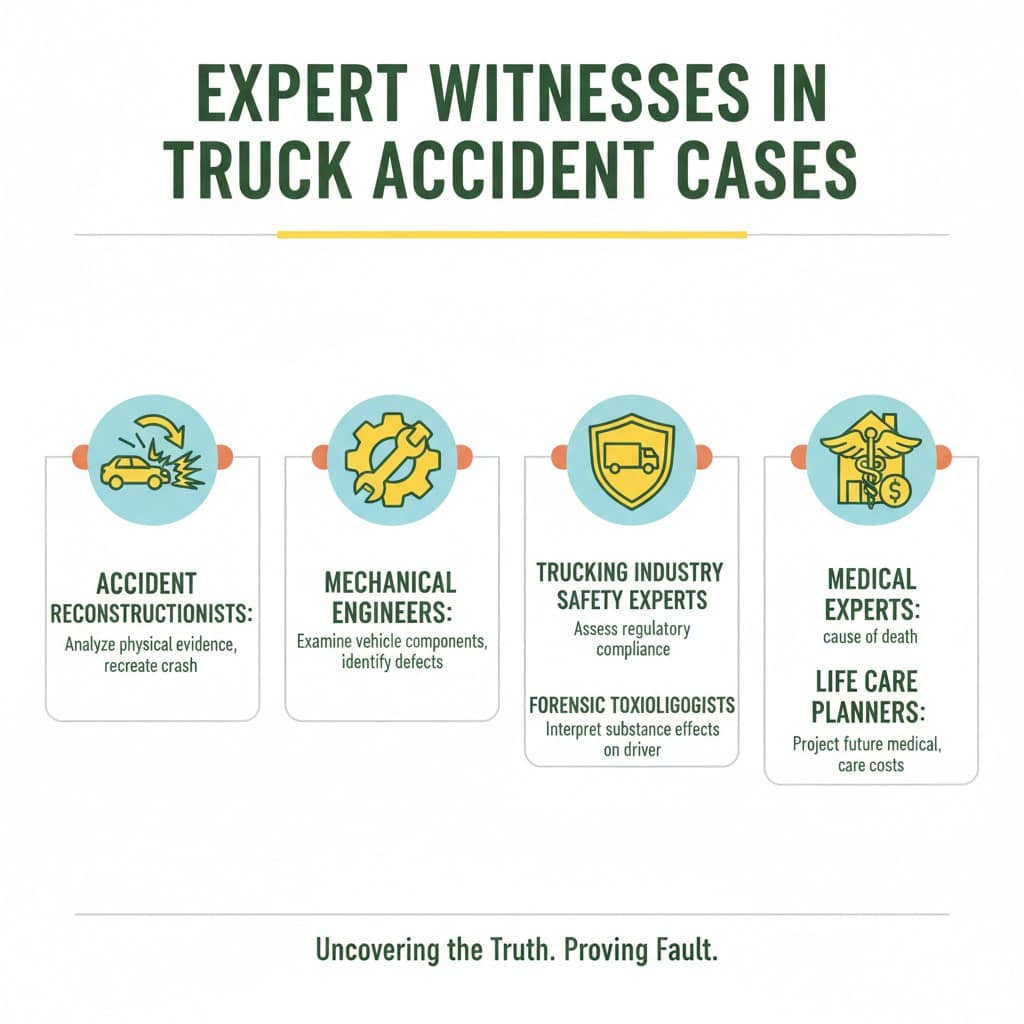The Complex Web of Liability in Truck Accidents

The aftermath of a fatal truck accident is a nightmare no family should endure. Commercial trucks’ sheer size and weight, often weighing up to 80,000 pounds, mean collisions with smaller passenger vehicles are almost always catastrophic. Sadly, statistics show that around 5,000 lives are lost in truck accidents each year, making these incidents particularly devastating.
We understand the confusion and grief that follow such a tragedy. Unlike standard car accidents, truck crashes involve a complex web of federal and state regulations, multiple potentially liable parties, and sophisticated corporate defenses. Navigating this intricate legal landscape requires specialized knowledge.
This comprehensive guide aims to illuminate these critical issues. We will explore the common causes of fatal truck accidents, the unique legal challenges involved, and how families can seek justice and compensation. We aim to provide clarity and support during a tough time, helping you understand your rights and the steps needed to hold negligent parties accountable.
When a large commercial truck collides with a smaller passenger vehicle, the consequences are often dire, leading to severe injuries or fatalities. The sheer disparity in size and weight makes truck accidents far more dangerous than typical car accidents. According to the U.S. Department of Transportation, more than half a million truck accidents occur each year, causing around 5,000 deaths annually, which represent 12 percent of all traffic-related deaths. Alarmingly, 77 percent of the people injured in truck accidents, and 86 percent of the people killed, are drivers of small passenger vehicles. This stark reality underscores why truck accidents are so devastating and why the legal landscape surrounding them is uniquely complex.

Unlike a standard car accident, where liability often rests with one or two drivers, a fatal truck accident can involve a bewildering array of potentially responsible parties. This complex web of liability is one of the primary reasons specialized legal representation is crucial. Identifying all negligent parties is essential for a comprehensive claim.
Potential parties include:
- The Truck Driver: Negligence can stem from various actions, such as distracted driving, fatigue, speeding, or driving under the influence.
- The Trucking Company: Often, the company employing the driver can be held liable through principles like vicarious liability (respondeat superior), meaning they are responsible for their employee’s actions while on duty. Additionally, companies can be directly negligent through poor hiring practices, inadequate training, or pressuring drivers to violate safety regulations.
- Maintenance Providers: If a third-party company was responsible for maintaining the truck and its negligence led to a mechanical failure that caused the accident, it could be held accountable.
- Parts Manufacturers: A defect in a truck component (e.g., brakes, tires) that contributes to a crash can lead to liability for the manufacturer.
- Cargo Loading Companies: Improperly loaded or secured cargo can shift during transit, causing the truck to become unstable and leading to rollovers or jackknife accidents. If a separate company were responsible for loading, it could be liable.
- Government Entities: In some cases, poor road design or maintenance by a state or local government entity might contribute to an accident.
Federal and state laws play a significant role in truck accident cases. The Federal Motor Carrier Safety Administration (FMCSA) sets stringent regulations for commercial motor vehicles and their drivers, covering everything from service hours to vehicle maintenance. Violations of these federal regulations often serve as strong evidence of negligence in a lawsuit. For instance, in Florida alone, around 32,000 truck accidents occur annually, leaving a staggering 140,000 people seriously injured. These statistics highlight the critical need for a thorough investigation into all potential sources of negligence.
Common Causes of Catastrophic Collisions
Fatal truck accidents rarely have a single, simple cause. Instead, they often result from a combination of factors, many of which can be traced back to negligence by the driver, the trucking company, or other entities. Understanding these common causes is the first step in proving fault.
- Driver Fatigue and Hours-of-Service (HOS) Violations: Truck drivers are often under immense pressure to meet tight deadlines, leading to them driving beyond legal limits. The Federal Motor Carrier Safety Administration allows freight-carrying drivers to drive up to 11 hours daily, and their work shifts can extend up to 14 hours. However, nearly one-third of all commercial truck accidents involve a truck driver who failed to take required rest breaks and get enough sleep. Fatigue significantly impairs a driver’s reaction time and judgment, leading to catastrophic errors.
- Distracted Driving: Like passenger vehicle drivers, truck drivers can be distracted by cell phones, navigation systems, eating, or other activities. As many as 71 percent of big truck crashes occur when drivers are distracted by non-driving activities. Given the size of commercial vehicles, even a momentary lapse in attention can have devastating consequences.
- Speeding: Driving too fast for conditions or exceeding posted speed limits reduces a truck driver’s ability to stop or react to hazards, especially given the truck’s greater stopping distance.
- Driving Under the Influence (DUI): While less common than other factors, alcohol and drug impairment among truck drivers is a serious concern. According to the FMCSA, 3.6 percent of truck drivers involved in fatal truck crashes in 2017 had alcohol in their systems. The legal limit for commercial motor vehicle drivers in Florida is 0.4 percent BAC, significantly lower than for passenger vehicle drivers. Between 2019 and 2022, employers reported 9,951 drug and alcohol violations in Florida truck drivers alone, highlighting a systemic issue.
- Improper Maintenance and Equipment Failure: Trucks require rigorous maintenance. Negligence in this area can lead to brake failure, tire blowouts, or other mechanical issues. Trucking companies are responsible for the truck’s condition and must ensure their vehicles are in good working order.
- Unsecured Cargo: If cargo is not correctly loaded or secured, it can shift, causing the truck to lose balance and potentially overturn or jackknife. It can also spill onto the roadway, creating hazards for other drivers.
The Role of the Trucking Company
The trucking company’s role in fatal accidents extends beyond merely employing the driver. They bear significant responsibility for the safety of their operations, and their negligence can directly contribute to tragic outcomes.
- Failure to Train and Supervise: Trucking companies must ensure their drivers are properly trained, licensed, and qualified. They must ensure drivers are qualified to drive and adhere to all safety protocols. Negligent hiring or insufficient training can directly lead to accidents.
- Pressuring Drivers and Falsifying Logbooks: Some companies prioritize profit and delivery speed over safety, pressuring drivers to work longer hours or manipulate their electronic logging devices (ELDs) to conceal HOS violations. This creates a dangerous environment where fatigued drivers are more likely to cause accidents.
- Ignoring Safety Violations: Companies that overlook or fail to address a driver’s history of traffic violations, drug/alcohol abuse, or safety complaints are directly negligent.
- Inadequate Vehicle Maintenance Schedules: Regular inspections and maintenance are critical for truck safety. Truck drivers must perform post-trip inspections of their vehicles, including components prone to failure, such as brakes and tires. Trucking companies can be liable for injuries if they allow trucks to remain in service with identified safety issues or fail to perform proper maintenance.
- Corporate Negligence: Beyond driver actions, a company’s systemic negligence in its safety culture, policies, or financial decisions can be a direct cause of accidents.
Why You Need Aggressive Truck Accident Attorneys for Your Case
The aftermath of a fatal truck accident is a profoundly challenging time for grieving families. Beyond the emotional toll, they face a daunting legal battle against well-resourced trucking companies and their insurance providers. This is where the expertise of an aggressive truck accident attorney becomes indispensable.
We understand that trucking companies and their insurers often deploy rapid response teams to accident scenes. Their primary goal is to gather evidence that minimizes their liability, not to ensure justice for victims. Without experienced legal representation, families can be at a significant disadvantage.
Aggressive truck accident lawyers play a crucial role in leveling the playing field. We possess the specialized knowledge of federal and state trucking regulations, the resources to conduct thorough independent investigations, and the tenacity to stand up against corporate legal teams. We aim to ensure all critical evidence is preserved, all liable parties are identified, and your family receives the maximum compensation for your devastating loss.
The Critical First Steps Handled by Aggressive Truck Accident Attorneys

Critical evidence can be lost or destroyed in the immediate aftermath of a fatal truck accident. This is why rapid intervention by experienced legal counsel is paramount.
- Evidence Preservation Letters: We immediately issue spoliation letters to all relevant parties, demanding they preserve crucial evidence such as driver logbooks, black box data, maintenance records, and drug test results. This prevents trucking companies from “losing” or altering evidence that could prove negligence.
- Rapid Response Investigation: Our team can dispatch accident reconstruction experts and investigators to the crash scene or impound lot within hours. This quick action ensures that perishable evidence – such as skid marks, debris patterns, and vehicle damage – is documented before it disappears.
- Securing the Truck’s Black Box (EDR): Most modern commercial trucks are equipped with Event Data Recorders (EDRs), often referred to as “black boxes.” These devices record vital information leading to a crash, including speed, braking, steering inputs, and throttle position. Securing and analyzing this data is crucial for accident reconstruction.
- Interviewing Eyewitnesses: Eyewitness accounts can provide invaluable insights into the accident’s dynamics. We promptly identify and interview witnesses while their memories are fresh.
- Documenting the Crash Scene: Comprehensive photographic and video documentation of the accident scene, including road conditions, signage, and environmental factors, is vital for building a strong case.
Navigating the Legal Maze with Aggressive Truck Accident Attorneys
The legal process following a fatal truck accident is complex and emotionally taxing. An attorney specializing in these cases guides families through every step, allowing them to focus on healing.
- Calculating Total Damages: We carefully calculate all economic and non-economic damages your family has suffered, ensuring no aspect of your loss is overlooked.
- Filing the Lawsuit: This involves preparing and filing a wrongful death claim, which is a specific type of lawsuit brought by surviving family members. The legal grounds for a wrongful death claim in a truck accident case typically involve proving that the defendant’s negligence directly caused the death. For example, Texas provides a remedy for the loss of a loved one called a wrongful death statute, allowing surviving family members to bring a lawsuit for their damages.
- Settlement Negotiations: We handle all communications and negotiations with insurance companies, who often attempt to settle claims for far less than their actual value.
- Litigation Strategy and Trial Preparation: We are prepared to take your case to trial if a fair settlement cannot be reached. This involves extensive preparation, including expert testimony, witness depositions, and compelling evidence presentation.
- Holding Negligent Parties Accountable: Our ultimate goal is to hold all negligent parties – from the driver to the trucking company and beyond – accountable for their actions and secure the justice and financial compensation your family deserves.
Uncovering the Truth: Key Evidence and Expert Analysis
Proving fault in a fatal truck accident requires a meticulous investigation and the collection of extensive evidence. Unlike car accidents, truck crashes generate a wealth of unique data points that can be crucial in establishing negligence.
- Event Data Recorders (EDRs) / Black Boxes: As mentioned, these devices provide a snapshot of the truck’s operation in the moments leading up to and during the crash. They can reveal speed, braking, acceleration, steering angle, and even seatbelt usage, offering objective data to reconstruct the accident.
- Electronic Logging Devices (ELDs): These devices record a driver’s service hours, ensuring compliance with federal regulations. ELD data can expose HOS violations, indicating driver fatigue as a contributing factor.
- Driver Qualification Files: These files contain the driver’s employment history, commercial driver’s license (CDL) information, medical certifications, drug and alcohol test results, and training records. Discrepancies or red flags in these files can point to negligent hiring or retention by the trucking company.
- Maintenance and Repair Records: These documents detail the truck’s service history, including inspections, repairs, and preventative maintenance. Poor or infrequent maintenance can indicate a company’s disregard for safety, leading to mechanical failures. Trucking companies are responsible for the truck’s condition and must ensure their vehicles are safe.
- Post-Crash Inspection Reports: Law enforcement or specialized inspectors may examine the truck for mechanical defects or regulatory violations after an accident. These reports provide an official record of the vehicle’s condition.
- Toxicology Reports: If there is suspicion of drug or alcohol impairment, toxicology reports from the driver can provide definitive evidence.
- Dashcam Footage: Many commercial trucks are equipped with dashcams, which can provide a visual record of the accident from the truck’s perspective and the driver’s behavior inside the cab.
The Indispensable Role of Expert Witnesses
Truck accident investigations’ technical nature often necessitates the involvement of various expert witnesses. These specialists provide objective analysis and testimony, translating complex data into understandable terms for judges and juries. Their contributions are vital in proving fault and establishing the full extent of damages.

- Accident Reconstructionists: These experts analyze physical evidence from the crash scene, vehicle damage, EDR data, and witness statements to recreate the accident sequence. They can determine factors like speed, points of impact, and driver actions. Their work addresses how accident reconstruction experts contribute to fatal truck accident cases.
- Mechanical Engineers: When equipment failure is suspected, mechanical engineers can examine components like brakes, tires, or steering systems to determine if a defect or poor maintenance contributed to the crash.
- Trucking Industry Safety Experts: These specialists are intimately familiar with FMCSA regulations, industry standards, and best practices. They can assess whether a trucking company or driver violated safety rules or acted negligently.
- Forensic Toxicologists: If drug or alcohol impairment is a factor, toxicologists can interpret test results and explain the effects of substances on driver performance.
- Medical Experts: Physicians and other medical professionals can explain the nature and severity of the victim’s injuries, the cause of death, and the long-term impact on the family.
- Life Care Planners: In cases involving severe, long-term injuries, these experts project future medical needs, therapy, equipment, and home care costs.
- Vocational Experts: These professionals assess the deceased’s earning capacity and how the accident impacts the family’s future financial stability.
Understanding Your Rights and Potential Compensation
When a loved one is tragically killed in a truck accident, surviving family members have the right to seek justice and compensation through a wrongful death lawsuit. However, navigating this legal landscape requires a clear understanding of specific legal grounds, time limits, and types of recoverable damages.
The legal grounds for a wrongful death claim in a truck accident case are rooted in proving that the negligence, recklessness, or intentional misconduct of another party (or parties) directly caused the death. This can involve proving driver error, trucking company negligence, defective parts, or other contributing factors.
A critical aspect of any legal claim is the statute of limitations, which is the strict deadline for filing a lawsuit. What is the statute of limitations for filing a wrongful death claim after a truck accident? This varies by state, but for personal injury and wrongful death claims, it is often two years from the date of the accident. Failing to file within this period can permanently bar your family from seeking compensation, making prompt legal consultation essential.
State-specific laws also govern wrongful death claims, including who can file a lawsuit (typically spouses, children, and parents) and how damages are calculated. Additionally, comparative negligence rules can impact your claim. If the deceased was found to be partially at fault for the accident, the compensation awarded might be reduced proportionally.
Types of Damages in a Fatal Truck Accident Claim
The types of damages that can be recovered in a fatal truck accident lawsuit are comprehensive, aiming to compensate families for both financial losses and profound emotional suffering. These typically fall into three categories:
- Economic Damages: These are quantifiable financial losses directly resulting from the death:
- Medical Expenses: Costs associated with the deceased’s final medical care, if any.
- Funeral and Burial Costs: Expenses related to the funeral, cremation, or burial.
- Lost Future Income: Compensation for the income the deceased would have earned over their lifetime, providing financial support to their family.
- Loss of Inheritance: The value of assets the deceased would have accumulated and passed on to their heirs.
- Loss of Services: The monetary value of the deceased’s household services, childcare, or other contributions.
- Non-Economic Damages: These compensate for intangible losses and emotional suffering:
- Pain and Suffering: The physical pain and mental anguish experienced by the deceased before their death.
- Loss of Companionship, Comfort, and Society: The emotional support, love, affection, and guidance the deceased provided to their family members.
- Mental Anguish: The emotional distress, grief, and sorrow experienced by surviving family members.
- Punitive Damages: These are awarded in specific cases not to compensate the family, but to punish the at-fault party for egregious conduct and to deter similar actions in the future. Punitive damages are typically reserved for gross negligence, intentional misconduct, or reckless disregard for safety. For example, punitive damages in Florida are limited to $500,000 or three times the total economic and non-economic damages, whichever is greater, and require clear and convincing evidence. Similarly, exemplary damages in Texas are awarded in rare cases where the defendant’s conduct was egregious or reckless.
Frequently Asked Questions about Fatal Truck Accident Claims
What are the most common causes of fatal truck accidents?
Driver error is the leading cause, including fatigue from violating Hours-of-Service rules, distracted driving (texting, using devices), speeding, and impairment from drugs or alcohol. Mechanical failures, such as faulty brakes or tires and improperly loaded cargo, are also significant factors. These issues are exacerbated by commercial trucks’ immense size and weight, making collisions far more lethal than those involving passenger vehicles.
How long do I have to file a wrongful death claim after a truck accident?
This is determined by your state’s statute of limitations, which sets a strict deadline. For personal injury and wrongful death, this period is often two years from the date of the accident, but it can vary significantly by state and specific circumstances. For example, in Texas, the statute of limitations for filing a wrongful death lawsuit is generally two years from the date of the accident. Consulting with an attorney immediately is crucial, as failing to file within the deadline can permanently bar you from seeking compensation.
Can I still pursue a claim if the at-fault truck driver died in the accident?
Yes. The driver’s death does not end a victim’s ability to seek justice. A claim can typically be filed against the driver’s estate. More importantly, the trucking company that employed the driver can often be held liable through legal principles like vicarious liability (where an employer is responsible for an employee’s actions within the scope of employment) or direct negligence in hiring, training, or maintenance. Federal regulations also mandate significant insurance coverage for trucking companies, ensuring that compensation is available even if the driver is deceased.
Conclusion
The aftermath of a fatal truck accident is overwhelming for families. The legal path to securing justice is filled with complexities, from federal regulations to corporate legal teams. Understanding the layers of liability, the importance of preserving evidence, and the full scope of available damages is essential. Seeking guidance from a legal professional specializing in these intricate cases is a critical step toward holding negligent parties accountable and achieving financial stability for the future.






